Last week, bib #s were assigned for the 2017 Boston Marathon. I immediately started the process of identifying qualifying marathons for each runner. I will utilize the qualifier information as part of my algorithm.
I was curious to see which marathons actually send the most runners to Boston. These rankings are estimates based on the runners I was able to match up to their qualifiers. I matched up runners to their qualifiers by matching their qualifying times (estimated by bib #) to my database of results.
The top qualifying marathons fall into 1 or more of the following categories.
Large Marathons – More finishers equates to more qualifiers and entrants for Boston.
Downhill Courses – Gravity works in the favor of the runner. These races are marketed towards those wanting to run Boston. A relatively large percentage of those that qualify actually register for The Boston Marathon.
Restricted Entry – Races like Boston, New York, London, and Chicago have barriers to entry. Either they have strict qualifying times, or offer priority towards faster runners.
#1 Boston (2016) (26639 Total Finishers)
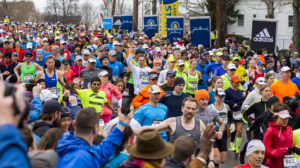 No surprise here for all of the obvious reasons. First, most runners ran qualifying times to run Boston in the first place, so they have the ability to run BQ times. Second, having run Boston before, they are likely to run it again when they qualify.
No surprise here for all of the obvious reasons. First, most runners ran qualifying times to run Boston in the first place, so they have the ability to run BQ times. Second, having run Boston before, they are likely to run it again when they qualify.
#2 Chicago (2015) (37182 Total Finishers)
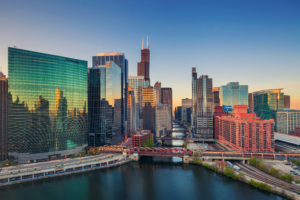
I only included Chicago 2015 in the calculation. There were quite a few runners that used their 2016 time in Chicago to upgrade their corral. If I were to combine those #s, the total Chicago qualifiers would rival that of Boston.
#3 New York (2015) (49828 Total Finishers)
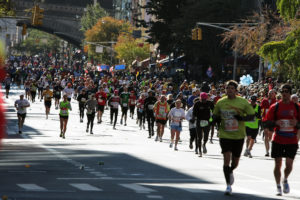 Similar story as Chicago. Very large marathon. Just by the sheer # of participants, you would expect New York to be near the top of the list. It also helps that Boston is a quick train ride away from Boston. 2016 Upgraded entries are not included in this calculation.
Similar story as Chicago. Very large marathon. Just by the sheer # of participants, you would expect New York to be near the top of the list. It also helps that Boston is a quick train ride away from Boston. 2016 Upgraded entries are not included in this calculation.
#4 Philadelphia (2015) (9153 Total Finishers)
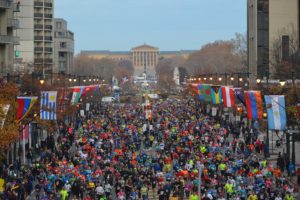
Marathons close in vicinity to Boston are well represented. Philadelphia is the first marathon on this list that has proven to be a prime target for cheating. Boston, Chicago, and New York are very difficult (but not impossible) to cheat at. Philadelphia did make some strides in 2016. I have identified and reported runners with questionable results that are registered for Boston.
#5 California International (2015) (6174 Total Finishers)
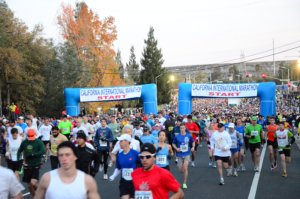
Combining a relatively large marathon, and the fact that it is downhill, puts this marathon 5th on the list. The CIM course has a net drop of 340′. Not as severe as some other marathons on this list. But this downhill course is a popular destination for West Coast runners in need of a Boston Qualifying time.
#6 London (2016) (39091 Total Finishers)
The only entry from across the pond. The London Marathon was the largest marathon (in terms of total finishers) during the qualifying period. No surprise that London made the list.
#7 Houston (2016) (7807 Total Finishers)
A flat course with very few turns. Weather is usually mild for this race, which takes place in January.
#8 Mountains 2 Beach (2016) (2006 Total Finishers)
At least 20% of Mountains 2 Beach finishers qualify AND register for Boston. As its name implies, it is a downhill course. It is about 675 feet net downhill. The course starts uphill, and drops 981 feet from its highest point.
#9 St. George (2015) (5462 Total Finishers)
Another downhill marathon. 2482 Feet in net elevation loss.
#10 Twin Cities (2015) (8586 Total Finishers)
Flat course, run in the fall. One of the largest marathons in the U.S. rounds out the top 10.
And The Rest of The Top 20….
#11 Erie Marathon at Presque Isle (2016)
#12 Toronto Waterfront Marathon (2015)
#13 Columbus Marathon (2015)
#14 Marine Corps Marathon (2015)
#15 Ottawa Marathon (2016)
#16 Baystate Marathon (2015)
#17 Big Cottonwood Marathon (2016)
#18 Los Angeles Marathon (2016)
#19 Indianapolis Marathon (2015)
#20 Richmond Marathon (2015)
I will wait until a later article to get on my soapbox regarding the downhill marathons. But if the B.A.A. were to put in some restrictions regarding the maximum elevation loss in a Boston qualifying course, they would significantly reduce or eliminate those that earn qualifying times and are denied entry to Boston.
To contribute to the site, please consider a small contribution.
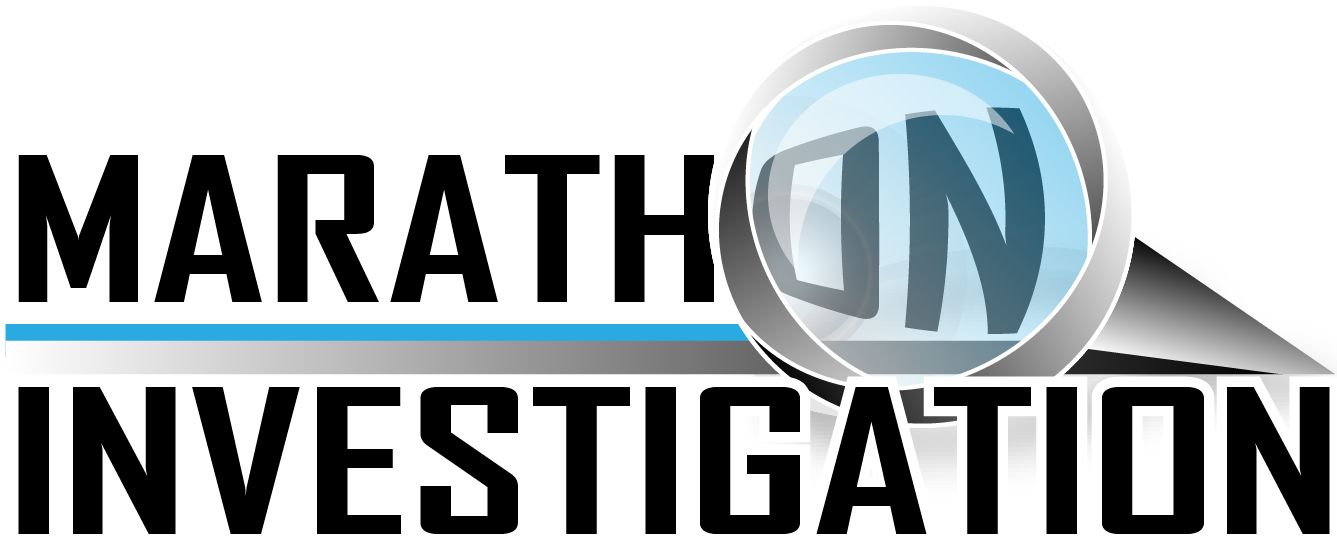
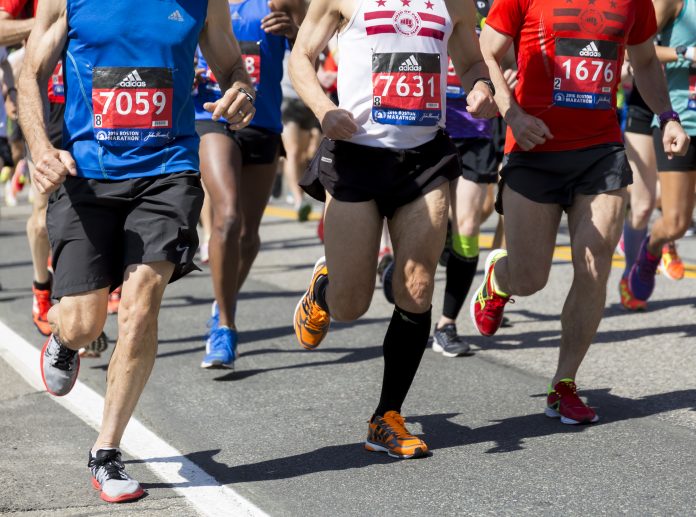
Could you list how many qualifiers or Boston entrants came from each marathon?
I feel comfortable with the rankings, but there are runners where I have yet to identify their qualifiers. As such, I am not comfortable putting out the raw #s.
Have you looked at Mt Charleston (its another Revel race that is downhill like Big Cottonwood) last year in its inaugural year it had a 40% BQ rate and was so popular from that it sold out this year and people are paying 3x’s the race registration in hopes for a bib (I was offered $300 for mine that cost me $90). It might have missed your list as its a one year race right now.
Surprised the “West Wyoming Marathon” did not make the list year. I’ve heard it’s a great course. http://www.newyorker.com/magazine/2012/08/06/marathon-man
Sadly, the West Wyoming Marathon only lasted one year. It was so fast not a single runner broke a sweat.
Derek, I’d have to agree with you regarding the net downhill marathons, however, I think a number needs to be drawn in the sand. For example, anything in excess of 500′. Big Cottonwood, St. George, Tucson, and others abuse the system. Not sure of the percentage of runners these marathons send to Boston. Those races also have their drawbacks (quad buster). The ups and downs of Boston can sure shred the legs. Cheers
Derek – I look forward to reading your thoughts about downhill marathons. Downhill marathons have undoubtedly been increasing in popularity as it has become harder to obtain a Boston entry. I live in Washington state, where a veritable cottage industry has popped up in downhill marathons. There used to be one famous one around here called the Light at the end of the Tunnel Marathon, and over the past couple years several copycat marathons have surfaced pretty much using the same exact course on different days throughout the year. In fact I just checked on findmymarathon.com and discovered there are now an eye-popping SIX marathons running that same course, FOUR of which are brand new within the past two years. I understand that Boston itself is a net downhill course but no one would ever claim that the elevation drop is giving anyone a competitive advantage.
My personal sense of pride would never let me run a downhill marathon, or at least I would never use a time run in such a race as a standard for comparison, other than saying “this is the time that I ran on THIS course, I ran it faster this year than the last” – in the same way that one would never bother comparing times from different 50K trail runs. Sure I like to compare myself to others as much as the next guy, but if I’m going to say that I’m fitter or a faster runner than the next guy, I want to at least be comparing apples to apples.
While downhill marathons may not be overt cheating as is course cutting and using bib mules, I don’t think anyone doubuts that it gives runners unfair advantage.
It feels great to see so many finishers of marathon race in all these cities.